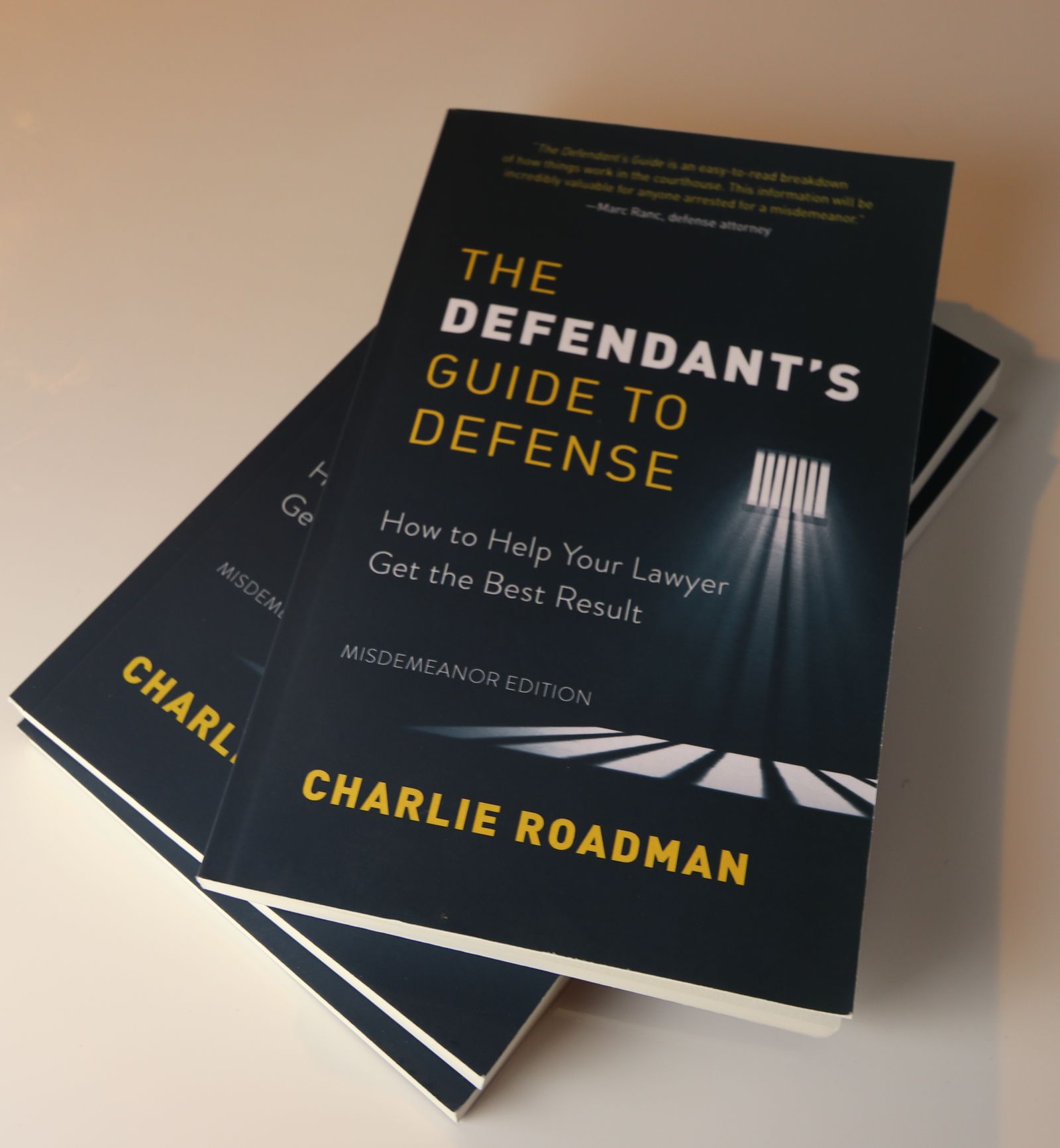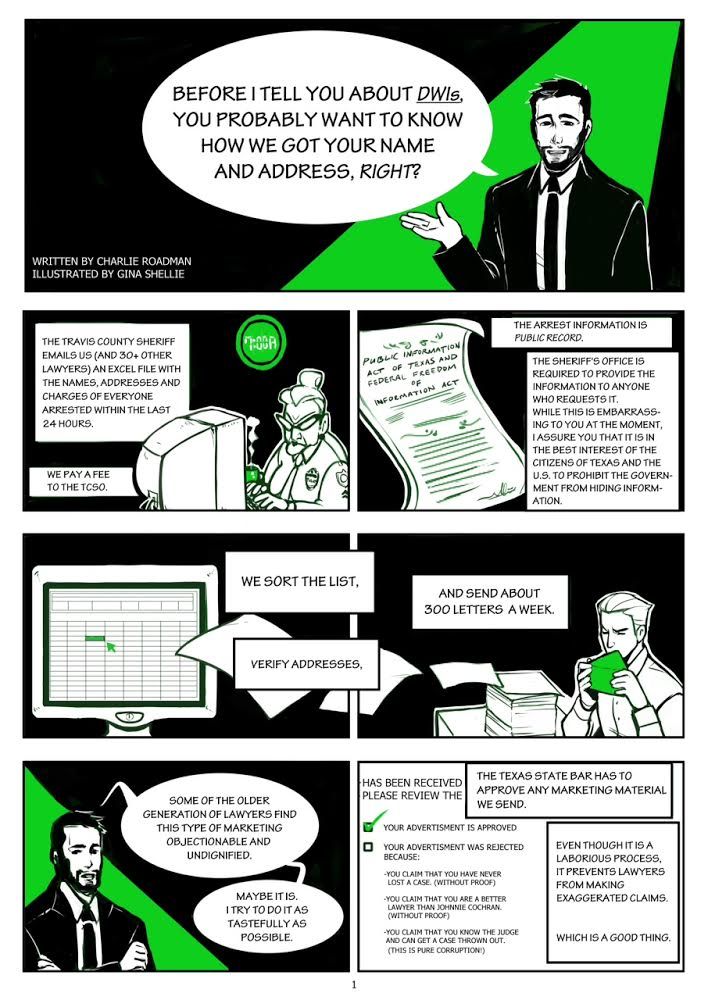The Ignition Interlock Device (IID)
Welcome to Austin DWI Charges with Charlie Roadman, Austin criminal defense attorney. Practical advice on dealing with an arrest.
Ellen Stader:
Good morning. Good evening. Good afternoon, depending on where you are. We are here in Austin, Texas. My name is Ellen Stader, and I'm talking with Charlie Roadman. He's a defense attorney here in Austin. Right now, we are talking about the ignition interlock device, which is another name for the breathalyzer? Is it the same thing? No?
Charlie Roadman:
No. Because the breathalyzer is the thing at the station that when you've been arrested and they want you to blow to determine your BAC.
Ellen Stader:
It's the thing that cops give you to blow.
Charlie Roadman:
Yes. Yes. The ignition interlock device is the device that makes you blow into it to start your car or people don't always realize this, that you have to blow into it while your car is driving. Randomly, it'll start beeping.
Ellen Stader:
That is still just insane to me.
Charlie Roadman:
It's nutty, but the blow thing, it's almost like a CB radio like back from the '70s. It has a little springy or like a guitar cord, spring [crosstalk 00:01:16] '70s, yeah.
Ellen Stader:
Uh-huh (affirmative), like a coil cord.
Charlie Roadman:
Coil cord. So you can easily bring it up to your mouth while you're driving,-
Ellen Stader:
Okay.
Charlie Roadman:
... and blow. They do give you five minutes and I think for liability reasons. So being that you can pull over-
Ellen Stader:
Right. You don't have to screech to the side of the road and do it right away.
Charlie Roadman:
You've got time. I've had it in my car a couple times and I've never once pulled over because you get so used to it, you can-
Ellen Stader:
Yeah. If you can sip out of a straw-
Charlie Roadman:
Right.
Ellen Stader:
... in your car, you can do this.
Charlie Roadman:
Right.
Ellen Stader:
Okay. Good to know.
Charlie Roadman:
Although it does require a certain type of blowing that you have to get used to. They want the air that's deep in your lungs, so that you're not just washing your mouth out with water just blowing.
Ellen Stader:
Right.
Charlie Roadman:
So they need that. To get that amount of air from deep down there, they need you to blow a long time.
Ellen Stader:
Ah.
Charlie Roadman:
So some people, it takes them a while. They'll just blow full on, but they can only blow full on for like four seconds, so it's just as [inaudible 00:02:30], you're out. But you have to take a deep breath and blow at a lower pace-
Ellen Stader:
For longer.
Charlie Roadman:
... for longer. If you're elderly, that's trouble or if you're young-
Ellen Stader:
Yeah, or if you have any compromised respiratory action.
Charlie Roadman:
Right.
Ellen Stader:
Yeah.
Charlie Roadman:
So it's not as easy as just a breath, but people get used to it.
Ellen Stader:
Mm-hmm (affirmative), yeah.
Charlie Roadman:
That freaks people out. I will tell you that people can't see you blow unless you want them to see you. I'm driving, I would blow and look around. No one's looking at you.
Ellen Stader:
And to be clear, you did this to test the device so that you could tell people what it was going to be like.
Charlie Roadman:
Right.
Ellen Stader:
Okay.
Charlie Roadman:
So I could do like what I'm doing now, explaining all the things that they don't tell you. The company tries to tell you stuff, but the court system doesn't tell you things because...
Ellen Stader:
Right.
Charlie Roadman:
I wanted to talk about the nuances of it.
Ellen Stader:
Mm-hmm (affirmative). Actually, let's go back to the beginning and explain... We've explained what it is and how it works, but what role does it play in the... So you get stopped for a DWI and how do you end up with an ignition interlock device?
Charlie Roadman:
Great question. It really depends on the judge who magistrate you, which is the judge that sets the conditions of your bond. This has evolved over the 20 years I've been doing it, but currently, they will have an ignition interlock device requirement if it's a second DWI or it's a first and the facts are not good, like there's been a collision or the BAC, if they have it at the time.
Ellen Stader:
Blood alcohol content.
Charlie Roadman:
Yeah, if they have it and it's high.
Ellen Stader:
Mm-hmm (affirmative).
Charlie Roadman:
Then it depends also on the magistrate judge. There's like 20 different magistrate judges, so depending on the one you get. Some of them are more inclined to do an ignition interlock device and some of them might be more selective about it. I will tell you from the judge's perspective, there's no reason not to. Because basically, they're looking at it from the perspective of what if I don't put an IID as a condition and then a week, a month goes by and this person does it again and someone gets killed.
Ellen Stader:
Right.
Charlie Roadman:
Then I look like the person that didn't do the job.
Ellen Stader:
They wonder why did you not do that in the first place.
Charlie Roadman:
Right. So from their self-protective and to protect the society or our community, they're going to err on the side of why not have this device. Now, it's pretty humiliating. Universally, my clients, no one's ever wanted it.
Ellen Stader:
Of course.
Charlie Roadman:
They often don't have an accurate... They think it's going to be worse than it is.
Ellen Stader:
Mm-hmm (affirmative).
Charlie Roadman:
They assume people will know and they just won't know. You can't drive it with someone else in your car and they not know.
Ellen Stader:
Right.
Charlie Roadman:
That's impossible.
Ellen Stader:
Sure. But from outside the car, people can't.
Charlie Roadman:
Yeah. And you can just bend down even just a little bit. As an experiment, in the H-E-B parking lot in broad daylight, just stuck my head up in blue looking around, and these are people 10 feet away that don't see it. They're doing their thing.
Ellen Stader:
Yeah, exactly. People aren't looking at other people.
Charlie Roadman:
No, they're not. I do have clients said that it's pretty bad like when they're a real estate agent and they have to-
Ellen Stader:
Have clients in their car.
Charlie Roadman:
Clients in the car.
Ellen Stader:
Right. Yeah.
Charlie Roadman:
Now, I'll just briefly talk about, there is another option and it's a portable device, but that's actually more intrusive because you have to blow into it three or four times a day and-
Ellen Stader:
Whether you're driving or not.
Charlie Roadman:
... whether you're driving or not. Even people that have no problem not drinking, it's hard to-
Ellen Stader:
Inconvenient to do anything three times a day on command.
Charlie Roadman:
Every four hours, you have to find somewhere privately to blow in this thing. Anyway, it's possible and I've got many of people who have done it, but it's not a... If I was in their situation, I would much prefer it in my car. That way, if I don't go anywhere, I don't have to do anything. And just to be clear, even if you have two cars, you can't drive the other car. If you have this as a condition-
Ellen Stader:
It always has to be the one with the IID.
Charlie Roadman:
Right.
Ellen Stader:
Yeah.
Charlie Roadman:
There's some scenarios like if they don't trust you or some other counties will say, "If you got two cars, you're going to get two devices." The judge has a lot of power and they're allowed to do this. It isn't unconstitutional to have bond conditions involving drugs and alcohol, which I do hear quite a bit. People say, "Well, I'm not been convicted," which is true, but the legislature allows them to add some reasonable conditions. Now, if the judge-
Ellen Stader:
In exchange for being released on bond,-
Charlie Roadman:
Exactly.
Ellen Stader:
... you have to... Yeah.
Charlie Roadman:
Yes. Now, if a judge said something absolutely nutty like you have to get the portable device, the ankle monitor, and the IID and it's your first DWI and you've never been in trouble, you just go to a different judge and go, "Judge, that's crazy."
Ellen Stader:
Yeah. You got something to vendetta.
Charlie Roadman:
Yeah. That's not going to happen-
Ellen Stader:
Right.
Charlie Roadman:
... in Travis County or really anywhere. But any reasonable conditions, they're allowed to do.
Ellen Stader:
So let me ask you this. So best case scenario, you have an IID. You blow in it every time you are required to. It always comes back clean. You do that for how long and what is the result?
Charlie Roadman:
That's a great, great... The problem, I can't answer that because-
Ellen Stader:
I know that every case is different.
Charlie Roadman:
Yeah. Sometimes people have it just while the case is pending. That could be six months. It could be a year.
Ellen Stader:
Mm-hmm (affirmative).
Charlie Roadman:
Then some people, if the facts are bad enough, they'll also have to have it during the probation.
Ellen Stader:
Ah, right.
Charlie Roadman:
There are scenarios where people have it continuously for three and a half years.
Ellen Stader:
Wow.
Charlie Roadman:
That's extreme and not normal.
Ellen Stader:
Sure.
Charlie Roadman:
But to get it removed... Sometimes, a judge will remove it before the case is done depending if there's a good reason and the facts aren't bad and they're confident that there's not going to be another problem. Anyway, you have to convince a judge to remove it or convince a prosecutor that it's not necessary as part of their result of the case.
Ellen Stader:
Got you.
Charlie Roadman:
Sometimes they'll say, "We'll dismiss the case if they do six months upfront," or they'll say, "We'll do deferred adjudication probation on obstruction of a highway, but ignition interlock device for half of the probation term." There's all sorts of ways, and it's basically whatever the prosecutor feels is appropriate that would protect the community, convince you not to be in the situation again. All the reasons are rational. They're not going to force somebody who doesn't seem like this was just a one time thing and the facts aren't bad. They're not going to force them to have it for three years.
Ellen Stader:
Right.
Charlie Roadman:
But if you've got a history of this and there's other, then they're going to say, "Hell, yeah. We're going to [crosstalk 00:10:47] as long as possible."
Ellen Stader:
You're going to have that for a while.
Charlie Roadman:
The IID is like the lower level one. Then there's the portable that I've talked about. Then the one after that's the ankle monitor, the SCRAM device you put on your ankle.
Ellen Stader:
Right.
Charlie Roadman:
Then after that is jail.
Ellen Stader:
Right. Okay.
Charlie Roadman:
There's no fourth monitoring system except for county jail.
Ellen Stader:
Got it. So let me ask you. We just talked about the best case scenario and how you get it finally taken out of your car or off your person. But what happens if you're driving around and you decide like, "Oh, one drink won't hurt me," and then you blow hot.
Charlie Roadman:
Right. If you blow hot, depending on where your case is, they could give you a slap on the wrist and say, "If it happens again, you're going to go to jail."
Ellen Stader:
Who gets the information, to start with?
Charlie Roadman:
Great. The pretrial services officer. It's not a probation officer, but it feels like a probation officer because they're the ones that deal with you while the case is pending.
Ellen Stader:
Okay.
Charlie Roadman:
So it's someone you-
Ellen Stader:
While you're out on bond-
Charlie Roadman:
While you're out on bond.
Ellen Stader:
... they're the person that watches you.
Charlie Roadman:
Yes. If you have an IID, they have special pretrial services officers that monitor you. By monitoring, it means they just get information from the ignition interlock device company, and there's like five or six different ones. They'll send them any information that there's a violation.
Ellen Stader:
Okay.
Charlie Roadman:
If it's the first violation, the pretrial services officer, depending on the facts of your case, they might give you a warning or they might go straight to the judge and revoke your bond and you go to jail. Anyway, my point is, don't have any violations.
Ellen Stader:
Of course. Yeah, that's a given.
Charlie Roadman:
What's unfortunate about this is the scenario you described where someone just decides to have a drink is not what's common. What's common is people drink the night before and they-
Ellen Stader:
And they think it's out of their system, but it's not.
Charlie Roadman:
... think it's out of their system, and it's not. They wake up. They feel fine. People feel fine-
Ellen Stader:
Right.
Charlie Roadman:
... after... Anyway.
Ellen Stader:
And they got to go to work or that store or whatever.
Charlie Roadman:
That product makes you feel fine. That's the result of the product of alcohol. So yes, they're like 100% they're like, "I felt fine." I'm like, "Well, no kidding. You felt great, I bet." Anyway, but even a tiny bit of alcohol, let's just say 0.01, like some little bit, since to the pretrial services officer who knows you were drinking because, I guess, this is important. When you get the ignition interlock device, the bond condition also says no drinking.
Ellen Stader:
Sure.
Charlie Roadman:
So it's not just you can't drive the car when you've been drinking. It's you're not supposed to drink at all. So if these hot blows that are in the morning, the people blow and there's just a little bit, the judge needs to know. They need because-
Ellen Stader:
Because you are in violation of your bond conditions.
Charlie Roadman:
... you're in violation. They think, "Well, you could have just driven your girlfriend's car."
Ellen Stader:
Right.
Charlie Roadman:
They know that there's options for cars and so they're not going to be protected by them going, "Well, he has an IID," because someone would go, "Well, he also has a girlfriend with a car."
Ellen Stader:
Right.
Charlie Roadman:
Anyway, so if the system knows. Then the other part about that is that getting a good result in the case, the prosecutors will often say, "If they've had no IID violations, we'll dismiss," or do this or that or that. That's a lot of our clients have had no violations. Unfortunately, a lot of them have.
Ellen Stader:
Mm-hmm (affirmative).
Charlie Roadman:
So then the prosecutors just go, "Well, how can we trust you? We told you not to do something. You did it.
Ellen Stader:
Right.
Charlie Roadman:
You thought you could get away with it," so you just look sketchy to them and they don't want to give dismissals to people that they think are just going to do it again.
Ellen Stader:
Yeah.
Charlie Roadman:
They want convictions because convictions, they hope, because of the escalating nature of the subsequent arrests, they hope the conviction will convince you. Anyway, it's all defense attorneys who deal in this are amazed at how many hot blows people do when they know this is the rule. You know you're going to drive that car.
Ellen Stader:
That's because alcohol is a demon.
Charlie Roadman:
It is. And it goes to the-
Ellen Stader:
That's the thing.
Charlie Roadman:
... judgment part.
Ellen Stader:
I love it, but I recognize it's a demon.
Charlie Roadman:
Yes. It is a demon, and feeling great doesn't mean it's not in you or feeling fine. We deal with that a lot and trying to convince judges not to... Also, if you blow, the judge can order you to do the portable or the ankle monitor. They can escalate.
Ellen Stader:
Yeah, escalate your...
Charlie Roadman:
So I say, A, follow the rules. So that means don't drink alcohol. If you're going to drink alcohol, make sure you don't blow into that device for 36 to 48 hours. Do some crazy amount of time. Now, then here's the one other thing that's important. People do blow into it or hot blows, and they say it wasn't alcohol, it was my mouthwash, and that would be a false positive. But you can fix that by washing your mouth out with water and then blowing again in five minutes and in 10 minutes until it's zero. Because they'll have a camera, so it'll show you blowing, blowing, blowing. If it was really alcohol that you'd ingested and it was deep in your lungs, you can't wash it out.
Ellen Stader:
You can get rid of that.
Charlie Roadman:
Yeah. You can't. It may go down a tiny bit, but it'll go down in a curve like the way alcohol was dissipated.
Ellen Stader:
Right.
Charlie Roadman:
So then what happens is our clients go, "I blew hot, Charlie," I'll get a frantic text. "I blew hot, but I had to go to work, so I just went in my girlfriend's car and I left." I'm on their side. I'm a sucker for believing people, but I don't believe you. I don't believe that was mouthwash. That was real alcohol that's why you left. I'm sure some percentage of time, that's true.
Ellen Stader:
Might be true.
Charlie Roadman:
Could be.
Ellen Stader:
Might be true.
Charlie Roadman:
But if it's really mouthwash or if it's kombucha or if it's really a false positive, then you just-
Ellen Stader:
There are ways to-
Charlie Roadman:
... sit in that car,-
Ellen Stader:
... repair the, yeah.
Charlie Roadman:
... drinking water, blowing until it's a zero.
Ellen Stader:
Mm-hmm (affirmative).
Charlie Roadman:
That's how we prove it. Because if you don't blow again and get it to zeros very quickly, just no judge on the planet will believe me.
Ellen Stader:
Right.
Charlie Roadman:
They'll just look at me and go. Because I'll say, "Judge, I believe him," and he or she will go, "Well, I thought you were smarter than that, Charlie." I'm like, "Oh." Anyway, you got to follow the rules here. Now, I will tell you how much it costs. That's all people really hate that. It's roughly $90 to $110 a month. There is-
Ellen Stader:
It's a little insult to injury there.
Charlie Roadman:
Yeah. And there's an installation fee and an extraction fee. Although I have some coupons on my website. If you go to my website, they're on there-
Ellen Stader:
It's awesome.
Charlie Roadman:
... for Smart Start, which is the company that we have used and they're reliable. So you can get that, but a lot of people are mad that they have to do that and they'll say, "Is that constitutional?" Yeah, it is. There's no court-funded ignition interlock device program.
Ellen Stader:
Right, yeah. It's just part of the whole package of your-
Charlie Roadman:
Your whole package. If you're truly innocent, it's pretty terrible.
Ellen Stader:
Yeah.
Charlie Roadman:
But unfortunately, there's nothing I can do about it. One last thing is that not having a car doesn't remove this condition. It just moves it up to the next condition where you have a portable [crosstalk 00:19:27].
Ellen Stader:
Carry one on you.
Charlie Roadman:
Yeah. Weirdly, and I've said this a bunch of times, if I were you, I would go buy $1,000-car which I'm aware that even that cheap car, some people can't afford, or borrow your grandmother's second car that she doesn't use or something. Put the device in because the alternative is worse with this portable.
Ellen Stader:
Yeah, having to do it three times a day.
Charlie Roadman:
Or four times a day.
Ellen Stader:
Or however many, yeah.
Charlie Roadman:
Yeah. It becomes ironic that someone charged with a DWI is actually pressured into getting a car that they didn't have, but there's not a whole bunch of absurdities in my field, but that does feel like one. The main reason is if not having a car got rid of that condition immediately, everyone would not have a car. They would just give it to their brother,-
Ellen Stader:
Right.
Charlie Roadman:
... give it to their whatever, and they go, "I don't have a car."
Ellen Stader:
That's not going to get you out of it.
Charlie Roadman:
No, it's not. Then the last thing I'll say is that people sometimes wait till the last minute to get the IID. Different courts have different time periods. Ours is about 20 days right now from the date of arrest. People will wait till the 19th day and then call up the company and they'll go, "Yeah, we'll get you in in eight days."
Ellen Stader:
Sure. Right. And then you're screwed.
Charlie Roadman:
Yeah. Then you're like, "Oh, Charlie. Ask the judge." Then the judge is mad at you.
Ellen Stader:
Right.
Charlie Roadman:
It's like, let's not have the judge mad at us right now.
Ellen Stader:
From something that is probably preventable.
Charlie Roadman:
Right. It's just call him up. As soon as you know you have to do this, call up the company and get it scheduled.
Ellen Stader:
Yeah. That's my way to just get things out of the way, but I recognize that that is not everyone's way.
Charlie Roadman:
It is not, and it's not my way either. I wouldn't be great at that, but that's my advice, is get that in your car. Don't have any hot blows, and it'll help on the case. If you don't do well, it could certainly prevent a dismissal, but if you do well, it can reduce the terms really much no matter what.
Ellen Stader:
Right.
Charlie Roadman:
It'll be better.
Ellen Stader:
So get the IID. Do it right, and get it over with.
Charlie Roadman:
Right.
Ellen Stader:
All right.



